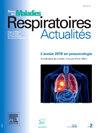Quelle place pour l'oncogénétique dans la prise en charge du cancer du poumon ?
Q4 Medicine
引用次数: 0
Abstract
Molecular profiling of lung cancer is a key tool in thoracic oncology. It aims to identify actionable tumor variants. However, it can also reveal an underlying genetic predisposition. The two main lung cancer predisposition syndromes are linked to germline pathogenic variants in EGFR, especially T790M, and to Li-Fraumeni syndrome, caused by TP53 variants. In young and/or never-smoker patients with adenocarcinoma, a genetic cause should be considered. A double EGFR alteration in the tumor may suggest a germline predisposition. Similarly, the presence of a germline TP53 variant along with a somatic EGFR or ROS1 alteration may indicate Li-Fraumeni syndrome. Identifying a germline variant has major implications for patients and their family. Asymptomatic carriers are often found among relatives, who may benefit from genetic counseling and surveillance. Although rare, these situations are being identified more often due to routine molecular testing. Awareness among oncologists and close collaboration with cancer genetics teams are essential for proper diagnosis and management 1877-1203/© 2025 SPLF. Published by Elsevier Masson SAS. All rights reserved.
肿瘤遗传学在肺癌治疗中的位置是什么?
肺癌分子谱分析是胸部肿瘤学研究的重要工具。它旨在识别可操作的肿瘤变体。然而,它也可以揭示潜在的遗传倾向。两种主要的肺癌易感综合征与EGFR的种系致病性变异(尤其是T790M)和由TP53变异引起的Li-Fraumeni综合征有关。对于年轻和/或从不吸烟的腺癌患者,应考虑遗传原因。肿瘤中双EGFR改变可能提示种系易感性。同样,种系TP53变异与体细胞EGFR或ROS1改变的存在可能提示Li-Fraumeni综合征。确定种系变异对患者及其家属具有重大意义。无症状携带者通常在亲属中发现,他们可能受益于遗传咨询和监测。虽然罕见,但由于常规分子检测,这些情况正在得到更频繁的识别。肿瘤学家的认识和与癌症遗传学团队的密切合作对于正确诊断和管理至关重要1877-1203/©2025 SPLF。Elsevier Masson SAS出版。版权所有。
本文章由计算机程序翻译,如有差异,请以英文原文为准。
求助全文
约1分钟内获得全文
求助全文
来源期刊

Revue des Maladies Respiratoires Actualites
Medicine-Pulmonary and Respiratory Medicine
CiteScore
0.10
自引率
0.00%
发文量
671
 求助内容:
求助内容: 应助结果提醒方式:
应助结果提醒方式:


